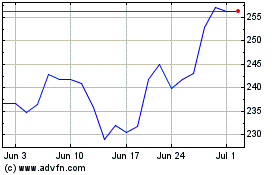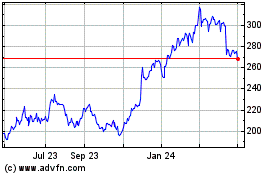By Sara Castellanos and Angus Loten
A coalition that includes tech giants and healthcare providers
is preparing to release global standards for mobile apps that
verify whether someone has had a Covid-19 vaccine.
The Vaccination Credential Initiative standards will incorporate
digitally-verified clinical data with a name and birth date that
can be also displayed as machine-readable QR codes.
After the open-source standards are released next month, they
can be integrated into mobile apps that people could use to verify
they have been vaccinated to gain admission to offices,
restaurants, bars, entertainment venues and other public
places.
Companies and large venues could also choose to request
additional verification, such as a driver's license, or temperature
checks in addition to seeing an individual's vaccine record
"We will have the published standards available next month. It
has progressed quite rapidly," said John Halamka, president of Mayo
Clinic Platform, a division of the nonprofit academic medical
center, who is helping lead the effort.
The group's more than 200 members include Microsoft Corp.,
Oracle Corp., Salesforce.com Inc. and healthcare providers. It
hopes the software framework will be the dominant standards used
worldwide for verifying Covid-19 vaccinations.
"What's new and exciting about (the new standards) is the
ability to digitally sign that information so it's basically
tamper-proof," said Paul Meyer, co-founder and chief executive of
coalition member the Commons Project, a nonprofit organization that
develops digital services.
The Commons Project plans to integrate the new software
standards into two free apps that are currently available,
CommonPass and CommonHealth. CommonHealth lets people collect,
manage and share their health data, and CommonPass lets people show
their Covid-19 health status in scenarios such as traveling and
returning to work.
The standards are currently going through an approval process by
members of the Health Level Seven International, or HL7, which
helps organizations exchange clinical data throughout the world,
Dr. Halamka said.
Microsoft said Joshua Mandel, its chief architect for
healthcare, contributed to development of the software standards.
"The aim ... is to provide individuals access to their Covid-19
vaccination records in a secure, verifiable and privacy-preserving
way," a Microsoft spokesperson said in a statement.
The group isn't getting paid for developing the standards, which
will be freely available for anyone to use. Healthcare
organizations can update their existing mobile apps to incorporate
the new standards once they are available.
"It absolutely has to be a joint effort," said Bill Patterson,
Salesforce's executive vice president and general manager of
customer relationship management applications. "This is the largest
vaccination effort in human history."
The enterprise software giant is contributing tools to the group
for interoperable messaging, workflow, software integration and
other capabilities, Mr. Patterson said. Salesforce didn't say how
much it is investing in the effort.
Various organizations are already piloting or planning to
introduce digital verification apps, or "passports."
On Wednesday, the European Union said it was introducing a
vaccination "passport" in both digital and paper form for EU
citizens traveling within the bloc.
Clear, the expedited airline security gate service, is testing a
Covid-19 test or vaccination-verification app on some flights into
Hawaii as part of a pilot program with the state.
International Business Machines Corp. launched a verification
service for Covid-19 health data last fall called Digital Health
Pass built on blockchain, the technology behind cryptocurrencies.
IBM, which is also part of the VCI coalition, charges commercial
clients, including local governments, for services such as
integrating the Digital Health Pass into their existing mobile
apps. IBM had been building the service before the pandemic and
will integrate the VCI standards after they are released. IBM
declined to say how much money it has invested in the development
of its Digital Health Pass.
IBM said it has offered feedback on several standards efforts.
Eric Piscini, global vice president of emerging business networks
at IBM, said he expects that mobile apps for Covid-19 health data
will have to comply with multiple standards.
Salesforce said it is working on integrating IBM's Digital
Health Pass into its Work.com platform, designed to help employers
with a range of tasks such as staggering work shifts.
Alphabet Inc.'s Google isn't directly involved with the VCI
group, but said it is keeping a close eye on efforts to establish a
software standard, which can then be integrated into its
digital-wallet platform and accessed on Android mobile devices.
Sensitive health records require an extra layer of security,
along with compliance with health laws and other regulations, a
Google spokeswoman said.
"We stand ready to engage with public health bodies and other
organizations to understand their requirements," she said.
Write to Sara Castellanos at sara.castellanos@wsj.com and Angus
Loten at angus.loten@wsj.com
(END) Dow Jones Newswires
March 19, 2021 07:14 ET (11:14 GMT)
Copyright (c) 2021 Dow Jones & Company, Inc.
Salesforce (NYSE:CRM)
Historical Stock Chart
From Mar 2024 to Apr 2024

Salesforce (NYSE:CRM)
Historical Stock Chart
From Apr 2023 to Apr 2024
